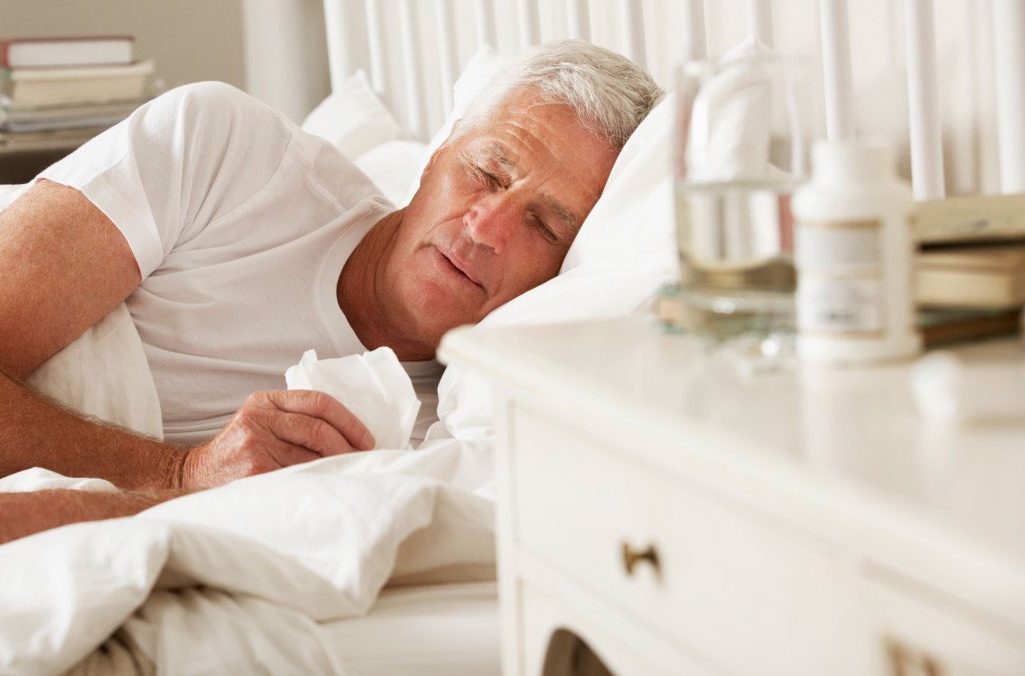How to Sleep with a Cold

What is the best way to sleep with a cold? It will help if you manage the congestion, sore throat, and other symptoms that are making you uncomfortable.
When you have a cold, your doctor will recommend that you get plenty of rest. Yet sleep sometimes doesn’t come easily when you’re coughing or struggling to breathe because of a clogged nose. If you’re drinking lots of liquids, you’ll also be waking up for bathroom trips.
To drift off, it helps to manage the congestion, sore throat, and other symptoms that are making you uncomfortable. But over-the-counter (OTC) cold remedies shouldn’t be your first move, as they have side effects and haven’t been shown to help.
Here are a few better remedies to help you find the best way to sleep with a cold.
YOU MIGHT ALSO LIKE: 8 Natural Cold and Flu Remedies
Drink a cup of tea with honey
Any warm liquid is soothing for your throat, but a spoonful of honey could calm your cough, too. Research in children finds honey relieves coughs and helps children sleep even better than an over-the-counter cough suppressant. (You shouldn’t give honey to kids under one, however.)
Turn on a cool mist humidifier
Bone-dry winter air parches the mucus membranes that are supposed to keep your nose and mouth moist, which can make an already irritated throat even scratchier. Turn on a cool-mist humidifier before bed to add moisture to the air while you sleep, says Shaila Pai-Verma, MD, an internist at Rush University Medical Center.
Use a spray saline
Some people find that a few spritzes of salt and water (saline) up your nose eases congestion. In children, saline nasal spray might also soothe a sore throat and cough. Saline is unlikely to cause any major side effects.
Raise your pillow
Tip your pillow to elevate your head and neck while you sleep. The inclined position gives you a better angle to breathe through a stuffed nose.
Try vapor rub – with caution
For decades, parents have relied on a mixture of camphor, menthol, and eucalyptus oils before bedtime to help their sick children get to sleep. Yet it’s not clear if it works, and there are risks.
Don’t rub vapor rub on children under two, and use it only on the neck and chest in kids under six years old. Never put it around a child’s nose or mouth because the ingredients can be toxic when swallowed or absorbed into mucus membranes.
Ditch decongestants
Decongestants shrink inflamed blood vessels in your nose and open clogged nasal passages to help you breathe easier. Yet such medicines can also make you jittery and interfere with your sleep. If your decongestant keeps you awake, use it earlier in the day and stick to saline spray before bed.
Use caution with nighttime cold remedies
Products marketed to relieve nighttime cold symptoms and help you sleep better work via a combination of ingredients. Usually they contain a pain reliever (acetaminophen), cough suppressant, and decongestant or antihistamine to relieve congestion and sneezing.
The trouble with multi-symptom nighttime cold relievers is they can contain more ingredients than you need. And some people find these drugs have the opposite effect than intended, contributing to wakefulness rather than sleepiness.
Use caution with nighttime cold remedies, especially if you have high blood pressure or an underlying medical condition. Don’t give any cold medicine to children under six, and check with your child’s pediatrician before giving them to older kids.
Make time for sleep
A good night’s sleep not only will help you get over your current cold but also could help you avoid a future illness. One study showed people who sleep six hours a night or fewer are four times more likely to catch a cold when they’re exposed to a virus than those who sleep seven hours or more nightly.
Updated:
December 04, 2023
Reviewed By:
Janet O’Dell, RN